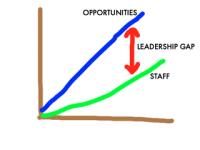 Recent trends show most current executives aren’t confident in giving up the reigns of their organizations to rising leaders. And, while leadership development is consistently rated high on many organizations “to-do” list, few have actually implemented programs to cultivate leadership skills. Organizations with this lack of leadership strategy are missing critical opportunities for business and revenue growth, a gap that millennials are hoping to fill in the future.
Recent trends show most current executives aren’t confident in giving up the reigns of their organizations to rising leaders. And, while leadership development is consistently rated high on many organizations “to-do” list, few have actually implemented programs to cultivate leadership skills. Organizations with this lack of leadership strategy are missing critical opportunities for business and revenue growth, a gap that millennials are hoping to fill in the future.
A leadership pipeline crisis
A majority of today’s executives are convinced there aren’t enough qualified leaders in their midst to lead their company into the future. These executives cite lack of “personal ambition” and “motivation” among some of the reasons next-generation leadership won’t find success. For these reasons, many executives are having trouble identifying and promoting future leaders.
On the other hand, some may argue this so-called leadership pipeline issue is an attempt to cover a growing insecurity among today’s executives. While their bravado is great for show, data reveals that behind-the-scenes today’s leaders seem to lack critical confidence in business decisions. A 2014 Deloitte Business Confidence survey of top business leaders found 66 percent of C-level executives claimed to be very confident in outperforming competitors, but 43 percent doubted their ability to address obstacles to growth.
Big opportunities for organizations
One thing most leaders can agree on is that leadership training programs and opportunities are an important investment for businesses. However, while 83% of organizations believe leadership development is important, only 5% have implemented solutions for all leadership. Without these programs in place, it becomes harder for those outside of the C-suite to rise in rank, and those that do may lack appropriate leadership skills. This leadership gap only perpetuates the notion among today’s leaders that rising stars won’t have the necessary leadership skills to move an organization forward.
The fact that many businesses aren’t leveraging leadership training programs also means many organizations aren’t realizing their full potential under skilled leadership. Research shows organizations with “high impact” leadership development strategies generate seven times the business impact, report higher retention rates, and are more likely to outperform peers financially. Moreover, successful leadership training can ensure a competitive advantage, facilitate collaborative partnerships (internally and externally), help facilitate change, create a coaching culture, help leaders adapt, and encourage communication.
The next generation of leadership
On the other end of the pipeline, those waiting in the wings have major concerns about today’s leadership styles. Millennials, the generation that will eventually drive today and tomorrow’s businesses, believe today’s leaders are too autocratic. In their view, today’s leaders focus on profit and personal reward, while the true focus should be on people and customers. The future may bring a rise of collective leadership and decline of the “heroic leader,” a leadership style embraced among millennials. Tomorrow’s leaders will be more likely to rely on the support of other coworkers when making decisions or achieving goals.
And that’s how individual leadership is evolving. There is no longer a reliance on one single “heroic leader”. Instead, that has evolved into a different type of individual leadership – collective leadership — which is leadership in the form from multiple individuals. While still considered an “individual” skill, it has shifted with flatter business hierarchies and open door policies. No more singular leadership in the traditional sense, but one the best ideas and decisions come from several thought leaders in the company.
Other leadership skills important to millennials include strategic thinking, being inspirational and strong interpersonal skills.
Exactly how we’ll bridge the gap between today’s and tomorrow’s leaders remains uncertain. However, those eager to be promoted to the C-suite can benefit from being well-versed in leadership skills valued by both today and tomorrow’s leaders. If you learn to be agile enough to speak both “languages,” you’re more likely to be respected as a business leader.
Embed this leadership Infographic on your site with the following code (Control-A then control-C to copy):
Your comments: Are you ready to become the next generation leader? If so, do you know if you have what it takes? I look forward to your comments.
Like this Infographic? Then help me share it on Facebook, Twitter, Linkedin, Google+ etc..
New to My Site? then start here – Soft Skills – How to Succeed Like an Executive
Best wishes to your career success!
Lei

These statistics speak a lot of how the present generation of leaders look like and their attitude towards performing a great role. Many fail to take up good soft skills training due to which they are unsuccessful at work environments. Thanks for sharing this informative post!!
Margoline, thanks for commenting. Glad it was helpful 🙂